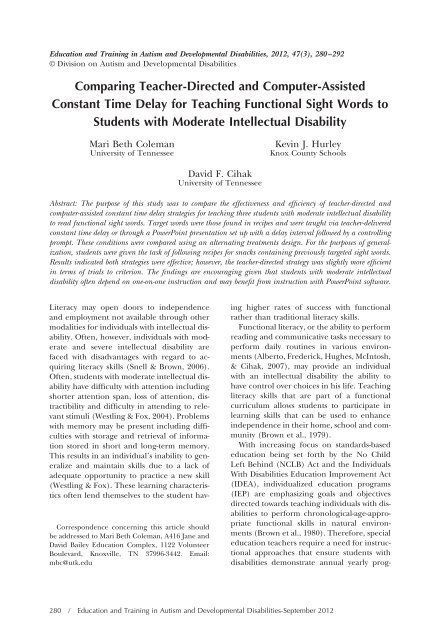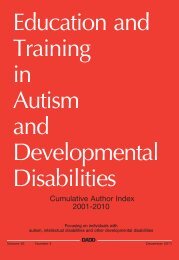etadd_47(3) - Division on Autism and Developmental Disabilities
etadd_47(3) - Division on Autism and Developmental Disabilities
etadd_47(3) - Division on Autism and Developmental Disabilities
You also want an ePaper? Increase the reach of your titles
YUMPU automatically turns print PDFs into web optimized ePapers that Google loves.
Educati<strong>on</strong> <strong>and</strong> Training in <strong>Autism</strong> <strong>and</strong> <strong>Developmental</strong> <strong>Disabilities</strong>, 2012, <str<strong>on</strong>g>47</str<strong>on</strong>g>(3), 280–292<br />
© <str<strong>on</strong>g>Divisi<strong>on</strong></str<strong>on</strong>g> <strong>on</strong> <strong>Autism</strong> <strong>and</strong> <strong>Developmental</strong> <strong>Disabilities</strong><br />
Comparing Teacher-Directed <strong>and</strong> Computer-Assisted<br />
C<strong>on</strong>stant Time Delay for Teaching Functi<strong>on</strong>al Sight Words to<br />
Students with Moderate Intellectual Disability<br />
Mari Beth Coleman<br />
University of Tennessee<br />
David F. Cihak<br />
University of Tennessee<br />
Kevin J. Hurley<br />
Knox County Schools<br />
Abstract: The purpose of this study was to compare the effectiveness <strong>and</strong> efficiency of teacher-directed <strong>and</strong><br />
computer-assisted c<strong>on</strong>stant time delay strategies for teaching three students with moderate intellectual disability<br />
to read functi<strong>on</strong>al sight words. Target words were those found in recipes <strong>and</strong> were taught via teacher-delivered<br />
c<strong>on</strong>stant time delay or through a PowerPoint presentati<strong>on</strong> set up with a delay interval followed by a c<strong>on</strong>trolling<br />
prompt. These c<strong>on</strong>diti<strong>on</strong>s were compared using an alternating treatments design. For the purposes of generalizati<strong>on</strong>,<br />
students were given the task of following recipes for snacks c<strong>on</strong>taining previously targeted sight words.<br />
Results indicated both strategies were effective; however, the teacher-directed strategy was slightly more efficient<br />
in terms of trials to criteri<strong>on</strong>. The findings are encouraging given that students with moderate intellectual<br />
disability often depend <strong>on</strong> <strong>on</strong>e-<strong>on</strong>-<strong>on</strong>e instructi<strong>on</strong> <strong>and</strong> may benefit from instructi<strong>on</strong> with PowerPoint software.<br />
Literacy may open doors to independence<br />
<strong>and</strong> employment not available through other<br />
modalities for individuals with intellectual disability.<br />
Often, however, individuals with moderate<br />
<strong>and</strong> severe intellectual disability are<br />
faced with disadvantages with regard to acquiring<br />
literacy skills (Snell & Brown, 2006).<br />
Often, students with moderate intellectual disability<br />
have difficulty with attenti<strong>on</strong> including<br />
shorter attenti<strong>on</strong> span, loss of attenti<strong>on</strong>, distractibility<br />
<strong>and</strong> difficulty in attending to relevant<br />
stimuli (Westling & Fox, 2004). Problems<br />
with memory may be present including difficulties<br />
with storage <strong>and</strong> retrieval of informati<strong>on</strong><br />
stored in short <strong>and</strong> l<strong>on</strong>g-term memory.<br />
This results in an individual’s inability to generalize<br />
<strong>and</strong> maintain skills due to a lack of<br />
adequate opportunity to practice a new skill<br />
(Westling & Fox). These learning characteristics<br />
often lend themselves to the student hav-<br />
Corresp<strong>on</strong>dence c<strong>on</strong>cerning this article should<br />
be addressed to Mari Beth Coleman, A416 Jane <strong>and</strong><br />
David Bailey Educati<strong>on</strong> Complex, 1122 Volunteer<br />
Boulevard, Knoxville, TN 37996-3442. Email:<br />
mbc@utk.edu<br />
ing higher rates of success with functi<strong>on</strong>al<br />
rather than traditi<strong>on</strong>al literacy skills.<br />
Functi<strong>on</strong>al literacy, or the ability to perform<br />
reading <strong>and</strong> communicative tasks necessary to<br />
perform daily routines in various envir<strong>on</strong>ments<br />
(Alberto, Frederick, Hughes, McIntosh,<br />
& Cihak, 2007), may provide an individual<br />
with an intellectual disability the ability to<br />
have c<strong>on</strong>trol over choices in his life. Teaching<br />
literacy skills that are part of a functi<strong>on</strong>al<br />
curriculum allows students to participate in<br />
learning skills that can be used to enhance<br />
independence in their home, school <strong>and</strong> community<br />
(Brown et al., 1979).<br />
With increasing focus <strong>on</strong> st<strong>and</strong>ards-based<br />
educati<strong>on</strong> being set forth by the No Child<br />
Left Behind (NCLB) Act <strong>and</strong> the Individuals<br />
With <strong>Disabilities</strong> Educati<strong>on</strong> Improvement Act<br />
(IDEA), individualized educati<strong>on</strong> programs<br />
(IEP) are emphasizing goals <strong>and</strong> objectives<br />
directed towards teaching individuals with disabilities<br />
to perform chr<strong>on</strong>ological-age-appropriate<br />
functi<strong>on</strong>al skills in natural envir<strong>on</strong>ments<br />
(Brown et al., 1980). Therefore, special<br />
educati<strong>on</strong> teachers require a need for instructi<strong>on</strong>al<br />
approaches that ensure students with<br />
disabilities dem<strong>on</strong>strate annual yearly prog-<br />
280 / Educati<strong>on</strong> <strong>and</strong> Training in <strong>Autism</strong> <strong>and</strong> <strong>Developmental</strong> <strong>Disabilities</strong>-September 2012

















